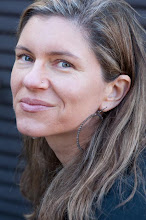Who does not need recovery? Anyone? We've all been traumatized, some seriously and some less seriously but no less destructively. As I search for ways to heal myself and others from the inevitable traumas life throws our way, I found myself in 2008 drawn toward the 12-Step process. Initially I sought relief from my food issues - I like chocolate a little too much, and I wanted to loosen its hold over me. I like my body at 125 pounds, but I suffer and obsess too much when my weight climbs higher.
I wanted a more expansive view. I wanted to clear the head space that thinking about my weight consumes and fill it with more nourishing self-talk. I didn't want to wake up every morning bargaining with myself over what I would eat or not eat. I wanted to exercise for fun rather than for the endless calorie calculations I used to perform. I wanted what you might call...
recovery.
Many have found solace and recovery in 12-Step Programs: Overeaters Anonymous, Food Addicts Anonymous, Food Addicts, as well as the earlier generations of recovery found in Alcoholics Anonymous and Narcotics Anonymous.
As I immersed myself in 12-Step work with my doctor/healer hat as well as my addict hat, I found that it offers tremendous spiritual growth, a field guide to living a life that is "happy, joyous and free," and recovery from addictions of all kinds.
To be honest, though, my experience with 12-Step has been mixed. Mostly, I object to the patriarchal, anachronistic, and heavily dogmatic Christian vibe of the literature. There is also a lot of controversy about whether food may be actually an addiction. I'm not sure where the line exists between food addiction vs. a sticky relationship with food vs. normal eating behavior. Are we all somewhere along a continuum from "normal" (my friends who eat one bite of chocolate cake and are satisfied) to "crazy" ("I kept slicing off small slices of that cake, and before I knew it the whole damn thing was gone!")? Science doesn't help us too much with this, but I digress.
One reason for my ambivalence is that the 12-Step main message: we are self-centered jerks before recovery, and our physical problem of being addicted to sugar (or alcohol, or sex, or debt) requires a physical, emotional and spiritual solution. So far, so good. But the path to working the 12-Steps often offends and irritates me. For instance: take ego deflation. The idea in 12-Step is that ego deflation is the only path to recovery. Here is where I see a few options. Traditional 12-Step has us perpetually catalog our character defects, accept blame for our part in any conflict we are part of, and own it. There is some risk here, especially for women who are trauma survivors and have eroded self-esteem.
Dr. Charlotte Kasl, PhD shares my concerns about 12-Step and offers an alternative.
Dr. Kasl offers believes that recovery must include an awareness of the patriarchal and political systems that contribute to addiction and co-depency. She offers an alternative to the 12-Steps (listed below) that urges addicts and those of us with dependency issues to "take charge of their lives and examine beliefs, addictions and dependent behavior in the context of living in a hierarchical, patriarchal culture."
Here are her 16 Steps of Recovery....
1. We affirm we have the power to take charge of our lives and stop being dependent on substances or other people for our self-esteem and security.
Alternative: We admit/acknowledge we are out of control with/powerless over _________ yet have the power to take charge of our lives and stop being dependent on substances or other people for our self-esteem and security.
2. We come to believe that God/Goddess/Universe/Great Spirit/Higher Power awakens the healing wisdom within us when we open ourselves to that power.
3. We make a decision to become our authentic selves and trust in the healing power of the truth.
4. We examine our beliefs, addictions, and dependent behavior in the context of living in a hierarchal, patriarchal culture.
5. We share with another human being and the Universe all those things inside of us for which we feel shame and guilt.
6. We affirm and enjoy our intelligence, strengths, and creativity, remembering not to hide those qualities from ourselves or others.
7. We become willing to let go of shame, guilt, and any behavior that keeps us from loving ourselves and others.
8. We make a list of people we have harmed and people who have harmed us, and take steps to clear out negative energy by making amends and sharing our grievances in a respectful way.
9. We express love and gratitude to others, and increasingly appreciate the wonder of life and the blessings we do have.
10. We learn to trust our reality and daily affirm that we see what we see, we know what we know, and we feel what we feel.
11. We promptly admit to mistakes and make amends when appropriate, but we do not say we are sorry for things we have not done and we do not cover-up, analyze, or take responsibility for the shortcomings of others.
12. We seek out situations, jobs, and people that affirm our intelligence, perceptions, and self-worth and avoid situations or people who are hurtful, harmful, or demeaning to us.
13. We take steps to heal our physical bodies, organize our lives, reduce stress, and have fun.
14. We seek to find our inward calling and develop the will and wisdom to follow it.
15. We accept the ups and downs of life as natural events that can be used as lessons for our growth.
16. We grow in awareness that we are sacred beings, interrelated with all living things, and we contribute to restoring peace and balance on the planet.






